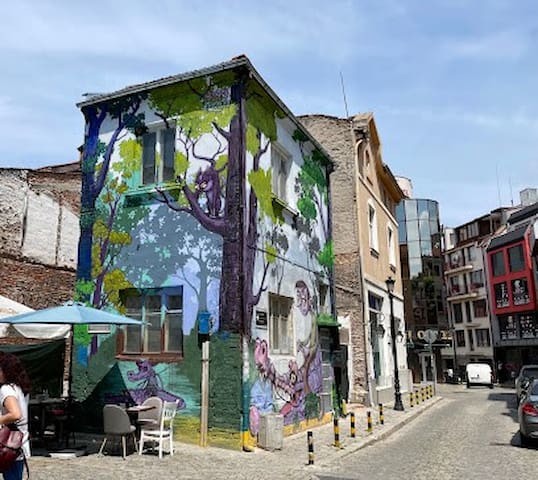Sightseeing
Remains of a Roman stadium built in the first century AD that seated up to 30,000 spectators.
52 il-persuni tal-post jissuġġerixxu
Ancient Stadium of Philippopolis
ulitsa "Hristo G. Danov"Remains of a Roman stadium built in the first century AD that seated up to 30,000 spectators.
Hillside complex combining culture & architecture from ancient times through the 19th century.
31 il-persuni tal-post jissuġġerixxu
Ancient Town Of Plovdiv - Architectural Reserve
24 ul. "Saborna"Hillside complex combining culture & architecture from ancient times through the 19th century.
Synchronised lights & water jets on a tree-fringed lake, with a children's splash fountain nearby.
34 il-persuni tal-post jissuġġerixxu
Singing Fountains
Synchronised lights & water jets on a tree-fringed lake, with a children's splash fountain nearby.
As Bulgaria’s first dedicated creative district, Kapana is a charming arts and cultural destination where cobblestone streets give way to restored buildings with art galleries and specialty shops. Patrons flock to sidewalk patios at an array of bakeries, diverse eateries and gastropubs that serve everything from classic regional eats to French cuisine.
95 il-persuni tal-post jissuġġerixxu
Kapana
As Bulgaria’s first dedicated creative district, Kapana is a charming arts and cultural destination where cobblestone streets give way to restored buildings with art galleries and specialty shops. Patrons flock to sidewalk patios at an array of bakeries, diverse eateries and gastropubs that serve everything from classic regional eats to French cuisine.
One my favourite places for sports - not just rowing but cycling (separate lane around the rowing canal), running and walking. Also great if you just want to chill with friends at one of the many cafés/restaurants by the water, or maybe walk through the trails in the neighboring forest or visit the zoo..
(Just don't forget your anti mosquito spray during summer evenings!)
Pedestrian Bridge Rowing base "Plovdiv"
One my favourite places for sports - not just rowing but cycling (separate lane around the rowing canal), running and walking. Also great if you just want to chill with friends at one of the many cafés/restaurants by the water, or maybe walk through the trails in the neighboring forest or visit the zoo..
(Just don't forget your anti mosquito spray during summer evenings!)
Archaeological complex with the crumbling walls of an ancient fortress & panoramic city views.
26 il-persuni tal-post jissuġġerixxu
Nebet Tepe
Archaeological complex with the crumbling walls of an ancient fortress & panoramic city views.
Hisar Kapia is a medieval gate in Plovdiv's old town and one of the most famous tourist sights in the city. The gate was built in the 11th century AD over the foundations of a gate from Roman times. Hisar Kapia is one of the three entrances to the acropolis of ancient Plovdiv.
7 il-persuni tal-post jissuġġerixxu
Gate "Hisar Kapia", Plovdiv
ploshtad "Hisar kapiya"Hisar Kapia is a medieval gate in Plovdiv's old town and one of the most famous tourist sights in the city. The gate was built in the 11th century AD over the foundations of a gate from Roman times. Hisar Kapia is one of the three entrances to the acropolis of ancient Plovdiv.
Sculptures, trails & viewpoints around a dramatic rocky hill over the city, plus a kids' mini-train.
11 il-persuni tal-post jissuġġerixxu
Youth Hill
Sculptures, trails & viewpoints around a dramatic rocky hill over the city, plus a kids' mini-train.
The aqueduct of Philippopol was built in II-III century AD. The aqueduct supplied the city with water. Today the preserved portion of the restored aqueduct near the hill Dzhendem tepe is an impressive symbol of the city.
Roman aqueduct
The aqueduct of Philippopol was built in II-III century AD. The aqueduct supplied the city with water. Today the preserved portion of the restored aqueduct near the hill Dzhendem tepe is an impressive symbol of the city.

